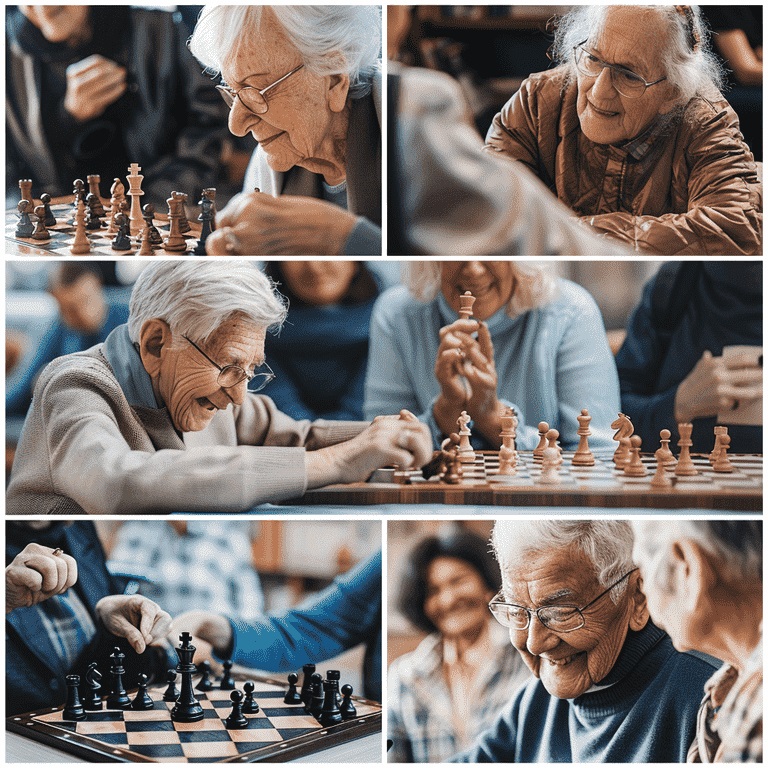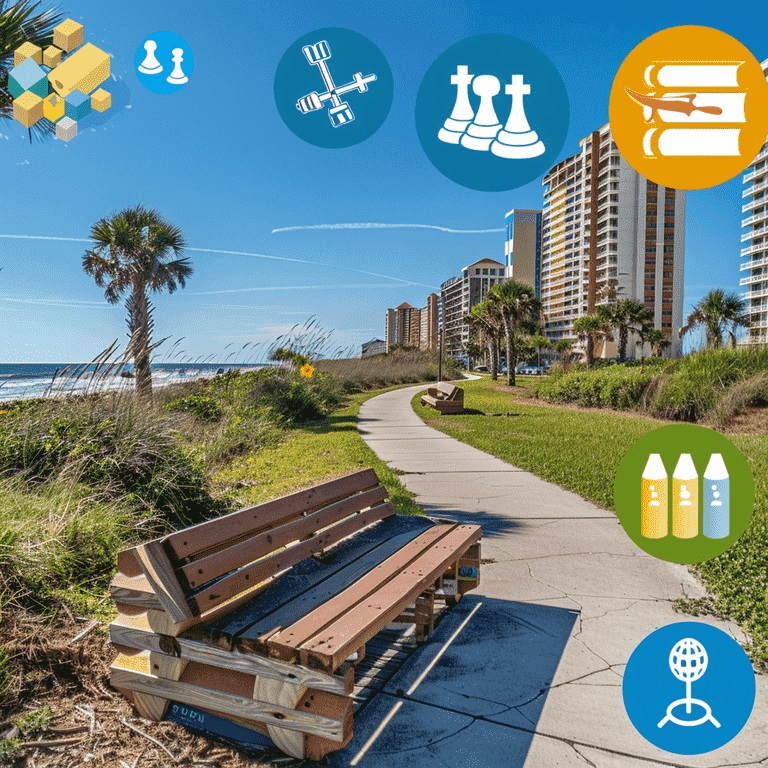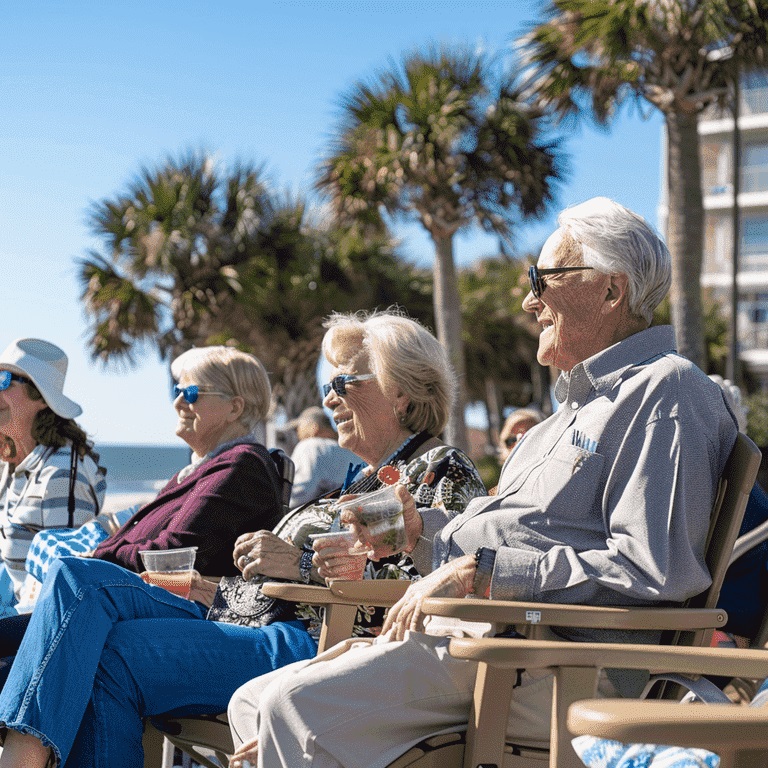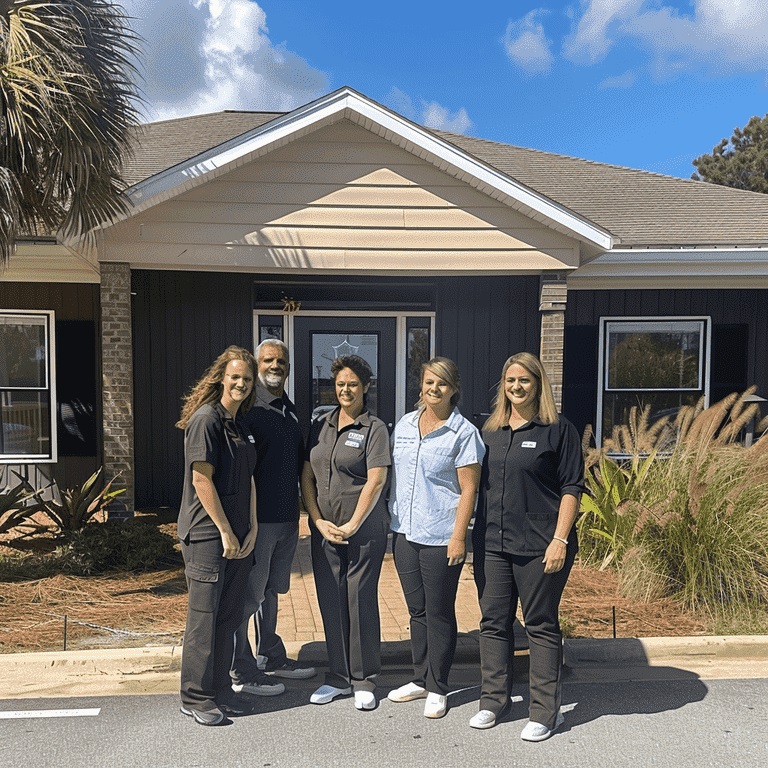

Introduction
Welcome to your guide on brain exercises for seniors. It’s for the vibrant coastal city of Myrtle Beach, SC. As we age, maintaining cognitive health becomes increasingly important. Regular brain exercises can help boost memory. They can also enhance thinking and slow decline. Myrtle Beach has an active senior community and many resources. It is perfect for exploring these activities. Are you a local or planning to visit? This guide will show you the best brain-boosting exercises for seniors.
Benefits of Brain Exercises for Seniors
Brain exercises are more than just passing the time. They are crucial for a healthy mind and body. Here are some key benefits:
- Cognitive health maintenance: Regular mental stimulation helps keep the brain sharp and can improve various aspects of cognitive function.
Delaying the onset of dementia and Alzheimer’s disease: Engaging in brain exercises is believed to build cognitive reserves, which can delay the onset of neurodegenerative diseases.
- Enhancing mood and mental well-being: Just as physical activity can lift your spirits, mental exercises can also improve your mood and overall mental health, keeping feelings of loneliness and depression at bay.

Types of Brain Exercises Suitable for Seniors
A variety of brain exercises can help seniors maintain their mental acuity. From crossword puzzles to jigsaw puzzles, there’s something for everyone. Let’s dive into some of the most effective types of brain exercises.
Memory Training Exercises
Good Memory is fundamental to our sense of self and our ability to navigate daily life. Here are a few exercises to sharpen your recall abilities:
Matching games and memory challenges: Engage in card games like Memory, where you flip over pairs of cards to find matches.
Using mnemonic devices: Create associations or rhymes to remember lists or essential information.
Recalling lists and sequences: Practice remembering grocery lists, daily tasks, or even retelling stories in the correct order.
Problem-Solving Activities
Keeping your problem-solving skills sharp can provide a sense of accomplishment and independence. Consider these activities:
Sudoku and crossword puzzles: Not only are they fun, but they also help with logic and problem-solving skills.
Logic puzzles and brainteasers: These can vary in complexity and stimulate critical thinking.
Strategy games and board games: Games like chess or checkers require forward thinking and strategy, which is excellent for cognitive function
Language and Word Games
Playing with words is a delightful way to keep the mind engaged and learning. Some activities include:
Scrabble and word search puzzles: These games expand your vocabulary and improve your language skills.
Learning a new language: It’s never too late to start and it’s incredibly stimulating for the brain.
- Storytelling and creative writing workshops: Joining a local group or online class can improve language skills and is a great way to share experiences.
- Joining a local group or online class can improve language skills and is a great way to share experiences.
These exercises improve the ability to visualize and manipulate objects. This skill is critical for everyday tasks.
Jigsaw puzzles: Building a jigsaw puzzle is satisfying and great for improving spatial reasoning.
Drawing, painting, and sculpting classes: Creative arts uniquely stimulate the brain, improving visual-spatial skills.
- and navigation exercises: Traditional map reading can be a fun challenge that boosts spatial orientation and planning skills.
Doing these exercises every day can greatly improve your mind and health. Stay tuned for more sections. We’ll see how to do these exercises in your life. We’ll explore local resources in Myrtle Beach. And, we’ll give tips for staying motivated.

Implementing Brain Exercises into Daily Life
Integrating brain exercises into your everyday routine can be enjoyable and beneficial for your cognitive skills. Here are some practical ways to ensure you’re consistently stimulating your mind:
Creating a daily brain exercise routine
Set aside specific times for mental exercise, just as you would for physical activity. This could be a crossword puzzle with your morning coffee or a jigsaw puzzle in the afternoon.
Mix it up to keep things interesting. Rotate between different types of brain games and activities to engage various cognitive areas.
Involve friends or family to make these activities more enjoyable and to foster a sense of community.
Incorporating brain exercises in group settings
Join or form a club at your local senior center or community group focusing on board games, book clubs, or even language learning.
Organize game nights where you play stimulating board games or card games that require strategy and problem-solving skills.
Attend workshops or classes that offer group learning experiences, such as painting, writing, or computer skills.
Leveraging technology: Apps and online platforms
Explore apps designed to improve cognitive skills through puzzles, memory games, and problem-solving challenges.
Use online resources to find stimulating activities that can be done alone or with others, such as virtual escape rooms or online courses on topics of interest.

Local Resources in Myrtle Beach for Seniors
Myrtle Beach is a treasure trove of resources for seniors looking to engage in brain-stimulating activities. Here’s how you can take advantage of what the area has to offer:
Senior centers and community groups
Grand Strand Senior Center: Offers a variety of activities, including computer classes, art workshops, and board game gatherings.
Horry County Council on Aging: Provides information on social events and educational opportunities tailored for seniors.
Libraries and educational institutions
Chapin Memorial Library: Hosts book clubs, educational talks, and digital literacy workshops for seniors.
Coastal Carolina University OLLI (Osher Lifelong Learning Institute): Offers courses and workshops on various subjects, from history to technology.
Online resources and local workshops
Meetup.com: Look for Myrtle Beach groups focused on hobbies and interests that challenge the mind, such as chess clubs or writing groups.
Local art galleries and museums Often offer workshops and classes that provide education and a chance to socialize.

Engaging with the Myrtle Beach Community
Getting involved in the community is fulfilling and provides numerous opportunities for mental exercise and combating memory loss. Here’s how you can engage:
Volunteer opportunities
- Teaching or mentoring: Sharing your skills and knowledge with others is a great way to keep your brain active.
Local charities and nonprofits: Community service can be mentally stimulating and incredibly rewarding.
Social clubs and interest groups
- Garden clubs or sports groups: Stay physically active while engaging your mind in planning and strategy.
Cultural societies or history clubs: Learn something new and share discussions with peers, which keeps the mind sharp..
Local events and classes
Community college classes: Many offer courses tailored to seniors, covering various subjects.
Cultural festivals and community events can offer unique learning experiences and the chance to engage with diverse groups.
Tips for Staying Motivated
Maintaining a routine of mental exercise requires motivation. Here are some tips to keep you inspired:
- Setting achievable goals: Start with small, manageable goals and gradually increase the challenge.
Tracking progress: Keep a journal of your activities and note any improvements in memory, problem-solving skills, or other cognitive areas.
- Engaging with peers for support: Share your experiences and challenges with friends or family members who can offer encouragement.
Remember, the goal is to find joy while keeping your mind active and engaged. By integrating these brain exercises into your life, participating in the vibrant community of Myrtle Beach, and leveraging local resources, you can help maintain your cognitive health and enjoy a fulfilling lifestyle.

Conclusion
Starting brain exercises to maintain and improve your thinking is commendable. In Myrtle Beach, seniors have a unique opportunity. They blend the joys of this beautiful coastal city with stimulating activities. Engaging in these activities helps you maintain a sharp and vibrant mind.
Remember, the point of these activities is to stave off cognitive decline. They include things like solving a daily crossword or joining a local art class. It’s about enriching your life. You do this by doing meaningful things. You also learn new skills and connect with your community. The guide outlines strategies and resources. They are not just steps to maintain brain health. They are also paths to a more fulfilling, socially connected, and vibrant senior life.
You can improve your mind by doing brain games and mental exercises. They include memory training, problem-solving, language games, and visual and spatial tasks. Each one is a step to a healthier, more active mind. We can leverage Myrtle Beach’s rich resources. These range from its senior centers to its schools. They provide a backdrop for endless learning and engagement.
As you continue your mental fitness journey, remember to stay motivated. Set achievable goals. Most importantly, enjoy the process. Completing a jigsaw puzzle brings joy. Mastering a new tech skill brings a sense of achievement. And, group classes create camaraderie. These are the true rewards of your efforts.
Use this guide to start. It will help you explore, engage, and enrich your life with brain exercises. Myrtle Beach is not just a destination. It’s a community full of chances for growth, learning, and connection. Please use these resources. And, remember, it’s never too late to invest in your brain.
Thank you for joining us on this journey through brain exercises for seniors in Myrtle Beach. May you find joy, companionship, and a sharper mind as you explore all this beautiful city offers. Here’s to a healthier, more engaged, and mentally active life ahead!
Frequently Asked Questions
Can brain exercises improve memory?
Yes, brain exercises can improve memory. They do this by strengthening neural connections and potentially increasing neuroplasticity. Neuroplasticity is the brain’s ability to reorganize itself by forming new connections.
How long does it take to see results from brain exercises?
The time to see results from brain exercises varies by the individual. It also depends on how often you exercise and the type of activities you do. Some people may notice cognitive improvements within a few weeks. Others may take longer.
Are digital brain training programs effective?
The programs can work if used a lot and challenge the brain. But, it’s important to do these digital exercises with physical, social, and mental activities. They should not involve a screen.
What are some signs that these exercises are working?
Signs that brain exercises are working can include:
- Improved memory recall.
Better problem-solving skills.
Increased focus and attention.
- A feeling of mental sharpness or clarity.
Can physical activity benefit cognitive health as well?
Physical activity is beneficial for cognitive health. Regular exercise helps improve thinking. It can also help keep the brain healthy. Aerobic exercise, in particular, can spur the growth of new brain cells.
Is there a best time of day to do brain exercises?
There isn’t a single “best” time for brain exercises. It depends on when you feel most alert and focused. Some people prefer the morning. They feel fresh. Others find their peak later.
How can I make brain exercises a habit?
Making brain exercises a habit involves adding them to your daily routine. You need to set reminders and vary the activities to keep them engaging. Consistency is critical, so dedicate a specific time each day to these activities.
Can brain exercises help prevent Alzheimer’s or dementia?
Brain exercises cannot prevent Alzheimer’s or dementia. But, they can delay symptoms by boosting cognitive reserve.
Are there specific brain exercises for people with memory loss?
The exercises are for people with memory loss. They include reminiscence, simple puzzles, and memory games.
How can seniors in Myrtle Beach get involved in group brain exercise activities?
Seniors in Myrtle Beach can join local senior centers. They can also join community groups, libraries, or schools. They offer programs and activities for seniors.
Is it too late to start brain exercises if I’m a senior?
It’s never too late to start brain exercises. Thinking activities help people of any age. Making them improves thinking no matter when you start.
How can caregivers support seniors in doing brain exercises?
Caregivers can support seniors. They can do this by encouraging brain exercises. They can also provide resources and materials. Caregivers can join in on the activities for mutual benefit. They can also celebrate progress and achievements. This will motivate continued engagement.
Glossary
Cognitive Function: The ability of the brain to process, store, retrieve, and use information. Includes memory, attention, language skills, and problem-solving abilities.
Cognitive Decline: A decrease in cognitive function, including memory loss, decreased problem-solving skills, and impaired language abilities. It is often associated with aging but can be mitigated through mental and physical activities.
Neuroplasticity: The brain’s ability to reorganize itself by forming new neural connections throughout life. Neuroplasticity allows the brain’s neurons (nerve cells) to compensate for injury and disease and adjust their activities in response to new situations or changes in their environment.
Dementia: A term used to describe a group of symptoms affecting memory, thinking, and social abilities severely enough to interfere with daily functioning. It is not a specific disease but a general term that describes many symptoms.
Alzheimer’s Disease: A progressive disease that destroys memory and other critical mental functions. It is the most common cause of dementia among older adults.
Memory Training Exercises: Activities designed to improve memory and cognitive function, often through repetition, mnemonic devices, or other memory aids.
Problem-Solving Skills: The ability to find solutions to difficult or complex issues. This skill is essential for everyday tasks and maintaining independence.
Language and Word Games: Games and activities that improve vocabulary, language skills, and verbal fluency. These can include crossword puzzles, Scrabble, and learning new languages.
Visual and Spatial Reasoning Tasks: Activities that require visualizing spatial relationships and manipulating objects mentally. These tasks are crucial for navigating the environment and understanding spatial information.
Mnemonic Devices: Techniques a person can use to help them improve their ability to remember something. It’s a memory tool to help your brain better encode and recall important information.
Sudoku: A number puzzle game that requires logical thinking and problem-solving skills. It involves filling a 9×9 grid so that each column, row, and nine 3×3 grids contain all the digits from 1 to 9.
Crossword Puzzle: A word puzzle that forms a square or rectangular grid of white- and black-shaded squares. The goal is to fill the white squares with letters, creating words or phrases by solving clues that lead to the answers.
Jigsaw Puzzle: A tiling puzzle that requires the assembly of often oddly shaped interlocking and tessellating pieces. Each piece usually has a small part of a picture on it; when complete, a jigsaw puzzle produces a full picture.
Board Games: Games that involve counters or pieces moved or placed on a pre-marked surface or “board” according to a set of rules. Some games are based on pure strategy, but many contain an element of chance, and some are purely chance, with no element of skill.
Digital Brain Training Programs: Computerized programs designed to improve various cognitive functions, including memory, attention, problem-solving skills, and mental speed.
Offsite Resources for You
Here are seven offsite resources related to brain exercises for seniors that you might find useful:
AARP Brain Games: A collection of games and puzzles designed to help keep the mind sharp and encourage cognitive fitness. AARP Brain Games
Lumosity: A popular digital brain training program that offers a wide range of cognitive and scientific games designed to improve memory, attention, flexibility, speed of processing, and problem-solving skills. Lumosity
BrainHQ: Offers exercises designed by neuroscientists to improve brain health and performance. BrainHQ
- SeniorNet: Provides computer and Internet education for older adults and seniors. SeniorNet’s Learning Centers offer a variety of courses to help seniors stay mentally active and connected. SeniorNet
- National Institute on Aging: Offers information on healthy aging, cognitive health, and Alzheimer’s prevention strategies. National Institute on Aging
- TED Talks: Offers a range of inspiring talks by experts on topics related to brain health, cognitive science, and the benefits of lifelong learning. TED Talks
- Coursera: Provides access to online courses from universities around the world, including courses on psychology, neuroscience, and other subjects that can stimulate cognitive function. Coursera
These resources offer a variety of tools and information to help seniors engage in brain exercises, learn new skills, and maintain cognitive health.

We’re Ready to Help Your Family
Thank you for exploring our resources on brain exercises for seniors. They also contain other valuable information. It supports cognitive health and well-being. We hope you found the content insightful. It was beneficial for your journey to maintain a vibrant and active mind.
At Grand Strand Comfort Care, we understand the importance of full care. This includes physical support and activities. It also includes strategies to boost seniors’ thinking. Our team is dedicated to providing a wide range of services. We tailor the services to fit your family’s unique care needs.
Please don’t hesitate to reach out if you’re ready to discuss how we can support you and your loved ones. Call us at 843-626-2613 to get the ball rolling on creating a personalized care plan. We look forward to serving your family and providing the care and support you deserve.
